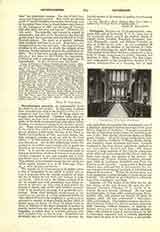

Covetousness, generally, an unreasonable desire for what we do not possess. In this sense, it differs from concupiscence only in the implied notion of non-possession, and thus may cover all things which are sought after inordinately. Classified under this general head, we may have covetousness of honors, or pride; of the flesh, or concupiscence properly so called; of riches, or covetousness proper (Lat. avaritia), or avarice. When covetousness of the flesh or of wealth has for its object that which is already the lawful possession of another, it falls under the ban of the Ninth or Tenth Commandment of God; and such desires, willfully indulged, partake, as we are told by the Lord (Matt., v), in their malice, of the nature of the external acts themselves. For he who deliberately desires the possession of another man’s lawful wife or goods has already in his heart committed the sin of adultery or theft. In its specific meaning, covetousness looks to riches in themselves, whether of money or of property, whether possessed or not, and pertains less to their acquisition than to their possession or accumulation. Thus defined, it is numbered among the sins which are called capital, because it is, as St. Paul says (Tim., vi), a radix omnium peccatorum.
The capital sin of covetousness is in reality rather a vice or inclination to sin, which is sinful only in that it proceeds from the unholy condition of original sin in which we are born, and because it leads us into sin. And so far is the desire—natural in us all—to acquire and hold possessions from being reproved as offensive by God, that, if kept within the bounds of reason and justice and resisted triumphantly in its inordinate cravings, it is positively meritorious. Even when indulged, covetousness is not a grievous sin, except in certain conditions which involve offense of God or the neighbor, e.g. when one is prepared to employ, or does actually employ, illicit or unjust means to satisfy the desire of riches, holds to them in defiance of the strict demands of justice or charity, makes them the end rather than the means of happiness, or suffers them to interfere seriously with ones bounden duty to God or man. Nourished and developed into an unrestricted habit, it becomes the fruitful mother of all manner of perfidy, heartlessness and unrest.
JOHN H. STAPLETON

